De Vlaamse schrijver Pol Hoste werd geboren in Lokeren op 25 maart 1947. Zie ook mijn blog van 25 maart 2007.
Uit: Thee
“- Toen ik naar hier kwam, mevrouw, vond ik niet gauw een huis.
– Maar u versierde een vrouw.
– Versieren, mevrouw?
– Vertel maar. Anders blijft u bij alle woorden stilstaan.
– Dat was het eerste, dat heb ik nu begrepen. Ik sta stil bij de woorden. De mensen hier, spreken. Ze gebruiken de taal. Eerbied is geen gebruik. De taal wel. Hoe kan ik de mensen begrijpen als ik de gebruiken niet ken?
Toen ik vertrok gaf mijn broer mij een kameel. Mijn familie is zeer rijk geweest. Bij ons kon iedereen komen, men werd te eten gegeven. Ik zei tegen mijn broer dat ik de kameel niet kon aannemen.
‘Voor deze verre reis,’ zei hij. ‘Je bent mijn broer, we hebben drie kamelen.’ Mijn vader had twee zonen, ik nam afscheid van mijn broer met deze weigering.
Hij zei: ‘De kameel kan op de boot. Hier is geld voor de reis. Zorg voor hem, geef hem behoorlijk te eten en praat met hem als hij zich ongelukkig voelt opdat hij in zichzelf opnieuw bij ons terugkeert. Zo zal je ook bij ons zijn, als heimwee je in een ver land overvalt. Vertel de schipper dat je gehecht bent aan je broer en je familie. Zeg je gebeden in zijn bijzijn en als hij een christen is, verzoen je met hem opdat de reis voorspoedig zou zijn.’
Ik kon de kameel niet aannemen en mijn broer was bedroefd. Bij ons wil het gebruik dat men eerbied heeft voor woorden.
– Maar hier kon u studeren? Onze taal heeft u kennis laten maken met invloedrijke mensen omdat u ijverig bent, nooit stilzit en overal uw handelsgeest aanwendt. Het bestaan van de westerse kunstgeschiedenis en het vrij verkeer van mensen en goederen hebben van u gemaakt wie u bent. In deze woestijn, als u wil.
– Ik woon in een huis en de mensen spreken tegen mij. Ik kocht een klein fototoestel en maakt foto’s van hun kinderen. Zo kon ik met hen beginnen praten. Hier houdt men van zijn portret. Dus heb ik een paar foto’s gemaakt in de achtertuin of bij de voordeur. Nu noemen ze mij zoals ik hen noem: mijn buren. Zegt u dit niet zo? We gebruiken dezelfde woorden voor elkaar. Zo bewaart men de vrede.”
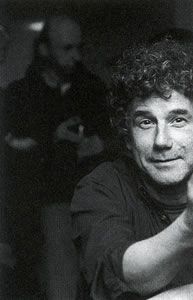
Pol Hoste (Lokeren, 25 maart 1947)
De Franse dichter en schrijver Jacques Bens werd geboren op 25 maart 1931 in Cadolive (Bouches-du-Rhône). Zie ook mijn blog van 25 maart 2007.
Patient
C’est dans le Beaujolais que j’attends ta venue.
Mon âme emplie de toi, pâle, circonvenue,
Pour passhâter le temps compte de blancs moutons.
Mais le ciel reste bleu et l’horloge, muette.
Je connais ton portrait signé Photopaton,
Mais je voudrais te voir décoiffée, longue et nue,
Cachant de tes deux mains ta poitrine menue,
Trois larmes dans tes yeux pour sourire. Mais ton,
Mais ton oeil reste bleu et ta gorge, muette.
Ca me fait des frémissements dans la luette.
Lors, pour meubler l’attente, et lors, pour patienter,
J’essaie de me rappeler que je suis poète,
Car le vers claudicant (le cri de la mouette)
A, pour qui sait l’entendre, un goût d’éternité.
Poème de métro
Qu’est-ce qu’un poème de métro ?
J’écris, de temps à autre, des poèmes de métro. Ce poème en est un.
Voulez-vous savoir ce qu’est un poème de métro ? Admettons que la réponse soit oui. Voici donc ce qu’est un poème de métro.
Un poème de métro est un poème composé dans le métro, pendant le temps d’un parcours.
Un poème de métro compte autant de vers que votre voyage compte de stations moins un.
Le premier vers est composé dans votre tête entre les deux premières stations de votre voyage (en comptant la station de départ).
Il est transcrit sur le papier quand la rame s’arrête à la station deux.
Le deuxième vers est composé dans votre tête entre les stations deux et trois de votre voyage.
Il est transcrit sur le papier quand la rame s’arrête à la station trois. Et ainsi de suite.
Il ne faut pas transcrire quand la rame est en marche.
Il ne faut pas composer quand la rame est arrêtée.
Le dernier vers du poème est transcrit sur le quai de votre dernière station.
Si votre voyage impose un ou plusieurs changements de ligne, le poème comporte deux strophes ou davantage.
Si par malchance la rame s’arrête entre deux stations, c’est toujours un moment délicat de l’écriture d’un poème de métro

Jacques Bens (25 maart 1931 – 26 juli 2001)
De Amerikaanse schrijfster Flannery O’Connor werd geboren op 25 maart 1925 in Savannah, Georgia. Zie ook mijn blog van 25 maart 2007.
Uit: The Habit of Being
“Compared to what you have experienced in the way of radical misery, I have never had anything to bear in my life but minor irritations — but there are times when the worst suffering is not to suffer, and the worst affliction, not to be afflicted. Job’s comforters were worse off than he was, though they did not know it. If in any sense my knowing your burden can make your burden lighter, then I am doubly glad I know it. You were right to tell me, but I’m glad you didn’t tell me until I knew you well. Where you are wrong is in saying that you are the history of horror. The meaning of the redemption is precisely that we do not have to be our history, and nothing is plainer to me than that you are not your history.”
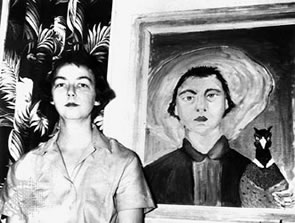
Flannery O’Connor (25 maart 1925 – 3 augustus 1964)
Staande voor een zelfportret
De Nederlandse cartoonist en striptekenaar Peter van Straaten werd geboren in Arnhem op 25 maart 1935. Zie ook mijn blog van 25 maart 2007.
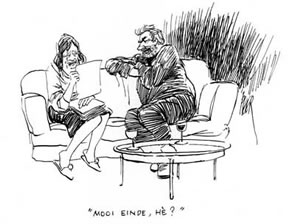
Mooi einde, he?
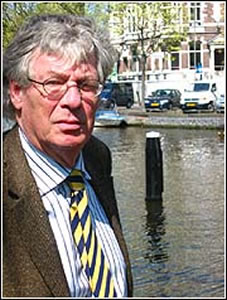
Peter Van Straaten (Arnhem, 25 maart 1935)
De Mexicaanse dichter en schrijver Jaime Sabines Gutiérrez werd geboren op 25 maart 1926 in Tuxtla Gutiérrez, Chiapas. Zie ook mijn blog van 25 maart 2007.
The Moon
You can take the moon by the spoonful
or in capsules every two hours.
It’s useful as a hypnotic and sedative
and besides it relieves
those who have had too much philosophy.
A piece of moon in your purse
works better than a rabbit’s foot.
Helps you find a lover
or get rich without anyone knowing,
and it staves off doctors and clinics.
You can give it to children like candy
when they’ve not gone to sleep,
and a few drops of moon in the eyes of the old
helps them to die in peace.
Put a new leaf of moon
under your pillow
and you’ll see what you want to.
Always carry a little bottle of air of the moon
to keep you from drowning.
Give the key to the moon
to prisoners and the disappointed.
For those who are sentenced to death
and for those who are sentenced to life
there is no better tonic than the moon
in precise and regular doses.
The Lovers
The lovers say nothing.
Love is the finest of the silences,
the one that trembles most and is hardest to bear.
The lovers are looking for something.
The lovers are the ones who abandon,
the ones who change, who forget.
Their hearts tell them that they will never find.
They don’t find, they’re looking.
The lovers wander around like crazy people
because they’re alone, alone,
surrendering, giving themselves to each moment,
crying because they don’t save love.
They worry about love. The lovers
live for the day, it’s the best they can do, it’s all they know.
They’re going away all the time,
all the time, going somewhere else.
They hope,
not for anything in particular, they just hope.
They know that whatever it is they will not find it.
Love is the perpetual deferment,
always the next step, the other, the other.
The lovers are the insatiable ones,
the ones who must always, fortunately, be alone.
The lovers are the serpent in the story.
They have snakes instead of arms.
The veins in their necks swell
like snakes too, suffocating them.
The lovers can’t sleep
because if they do the worms ear them.
They open their eyes in the dark
and terror falls into them.
They find scorpions under the sheet
and their bed floats as though on a lake.
The lovers are crazy, only crazy
with no God and no devil.
The lovers come out of their caves
trembling, starving,
chasing phantoms.
They laugh at those who know all about it,
who love forever, truly,
at those who believe in love as an inexhaustible lamp.
The lovers play at picking up water,
tattooing smoke, at staying where they are.
They play the long sad game of love.
None of them will give up.
The lovers are ashamed to reach any agreement.
Empty, but empty from one rib to another,
death ferments them behind the eyes,
and on they go, they weep toward morning
in the trains, and the roosters wake into sorrow.
Sometimes a scent of newborn earth reaches them,
of women sleeping with a hand on their sex, contented,
of gentle streams, and kitchens.
The lovers start singing between their lips
a song that is not learned.
And they go on crying, crying
for beautiful life.
Vertaald door W. S. Merwin

Jaime Sabines (25 maart 1926 – 19 maart 1999)
De Franse schrijver en dichter Jacques Audiberti werd geboren op 25 maart 1899 in Antibes. Zie ook mijn blog van 25 maart 2007.
Uit: Bâton et Ruban
„VAUBAN, dictant. – en liaison avec la cochonnerie, par l’entremise des glands, nous examinerons les avantages des forêts. Il se trouve assez de gens qui possèdent de mauvaises terres de mince rapport, qu’ils pourraient avec profit couvrir de forêts, attendu que, la première dépense faite, le surplus d
e la mise ne consisterait qu’en des entretiens… Vous suivez, monsieur Ragot?
RAGOT. – Qu’en des entretiens… Vous voulez dire des soins?
VAUBAN, péremptoire. – … Des entretiens, ce qui procurerait par la suite un bien
inestimable, le fonds conservé sans aucune perte portant un intérêt continu qui ne serai exposé qu’à la négligence du propriétaire. Il faudrait lui laisser la jouissance de ce fonds et ne point… et ne point…… sous prétexte que la marine en a besoin, ou la sculpture, priver une famille du bois de la forêt, pourvu que les affaires du roi n’en souffre pas… Une entreprise ne fût’elle que de cent arpents ne manquerait pas d’être fort honorable, qui, dès les quinze premiers mois, rembourse la dépense si l’on fait le coup en bois de moule…
RAGOT. – En bois de moule? Vous maintenez?
VAUBAN. – En bois de moule… parfaitement… Quoi? Non?… Tel qu’on en voit sur les ponts de Paris, qui se vend d’ordinaire quarante’cinq cinq à cinquante francs l’arpent, pris et débité sur les lieux aux frais du marchand. Vous rechignez. Contesteriez’vous ces prix?
RAGOT. – Monsieur de Vauban, comment songerai’je, moi cafard, moi hanneton, comment songerai’je à vous quereller à propos de quelque industrie humaine que ce soit! Je me permets, sans plus, de vous souligner le contradictoire entre l’extrême nouveauté de vos vues et la vieillerie souvent barbare et rebutante de votre langage. Votre bois de moule, on l’appelle bois de chauffage en rendant mieux l’idée. Quant à nommer cochonnerie la manière la plus experte et la plus rentable d’élever les pourceaux et les truies, il me surprendrait que nul n’en sourie. »
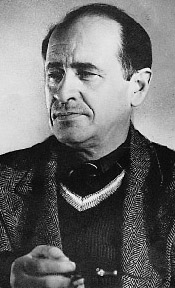
Jacques Audiberti (25 maart 1899 – 10 juli 1965)
Zie voor onderstaande schrijvers ook mijn blog van 25 maart 2007.
De Zwitserse schrijfster en beeldhouwster Erica Pedretti werd geboren op 25 maart 1930 in Šternberk (Tsjechië).
De Vlaamse schrijver Filip De Pillecyn werd te Hamme aan de Durme geboren op 25 maart 1891.
